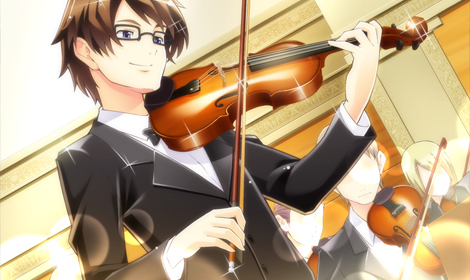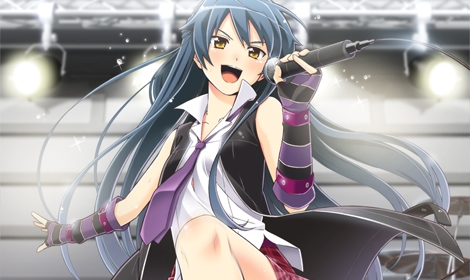From the first time I touched a piano when I was eight, I've always found the universal language of music to be filled with layers of depth and intrigue. Although I was never an excellent player, I learned to appreciate the time and effort it takes to create and perform masterful compositions. As fans found out after visual novel developer Overdrive's last effort to encapsulate this feeling in a coming-of-age story with Kira Kira, the search for a musically inspired passion for life can make a fantastic story.
The company's latest musical endeavor, Deardrops, had one simple goal in mind: to create a spiritual successor to the aforementioned series. While Deardrops certainly does rekindle some of the magic from Kira Kira, and to a much lesser extent Kira Kira: Curtain Call, Deardrops often hits a flat note and sputters off-key in places where its predecessor excelled. This is largely in terms of pacing and a rather exhausting common route.
It's hard not to compare Deardrops with Kira Kira. They're both visual novels centering around indie rock bands with two similar male protagonists who redeem themselves through the power of music. Just like Kira Kira's Shikanosuke Maejima, Deardrops' Suginami Shouichi is a lost soul hoping to find something to reignite his passion for life. After a tragic incident in Germany that sent his life spiraling downward, the formerly renowned classical violinist Shouichi suddenly finds himself down and out, working a nine to five caretaking job at a live house to make ends meet and resides inside a bus on top of his workplace. While working alongside his childhood friend Kanade, Shouichi rediscovers the joys of music through forming a rock and roll band and begins to forge unexpected relationships with his bandmates Gondo, Yayoi, Rimu, and Riho. These events begin to completely turn his life around.
Similar to the Second Literary Club Band, also known as d2b, the popularity of Shouichi's band, Deardrops, begins to boom after they perform at various venues across Japan and post their videos online. However, where Kira Kira focused on d2b becoming a nationwide sensation, the game Deardrops remains in its infancy as a local indie rock band which gives the reader an experience similar to Kira Kira but is more intimate. Gone are the awkward road trips, broken buses, and high school hijinks. Replacing them are dreams of making it big and the dedication and effort it takes to do so. Ultimately, this is where the narrative of the visual novel both succeeds and fails in its attempt to draw the reader into the plights of its characters.
Each of the bandmates has his or her own unique story and background to help flesh out their characters, although many of them are derivative of what's come before. The secret childhood crush Kanade, the "perfect" student Yayoi, Rimu with her dysfunctional family, and the brash tsundere Riho are all polished, shiny archetypes with their own personal issue that they need to resolve. The cohesive 'destined' bond that they seemingly have for each other is a joy to read on-screen, often with just enough character development to pull you through the game's initial lengthy common route.

Unfortunately, however, it appears that the game's scenario writers decided to hit the snooze button in regards to Rimu's and Yayoi's individual arcs as both Kanade's and Riho's routes are nearly four times their length, making them nothing more than what you would expect from a poorly written piece of fan fiction. Most of Rimu and Yayoi's arcs are spent around what feels like a forced romance without any sense of real chemistry between the girl and Shouichi at any point in their individual stories. They're boring, predictable, and ultimately skippable.
Thankfully though, both Kanade and Riho's arcs more than make up for the lack of depth in the other two routes. Whatever questions were raised during the common route are answered thoroughly in these two, making it an almost easy recommendation that you go directly to their arcs without bothering with the other two so-called 'minor' characters. However, if you find yourself struggling to persist through Deardrops like I did at times, then going directly to Riho's is the best piece of advice I can offer.
Riho's arc is easily the most engaging individual route out of the four heroines. Wrapping up most of Shouichi's background story, it's clear that she's seen as the canonical lead for the visual novel. The writers paid so much attention to every painstaking detail of her character and her relationship with Shouchi, that it's the only one that feels really authentic, making her ending somewhat of a bittersweet story. Not to mention, there are a few awesome cameos for fans who played through Kira Kira which will have you begging MangaGamer to consider localizing the crossover fandisc d2b vs. Deardrops -Cross the Future-.
As a visual novel revolving around music, Deardrops background tunes are disappointingly forgettable, although the vocal tracks are simply outstanding as expected of the game's producer personal band milktub. Of particular note are my favorite tracks, "Noisy Sweet Home,""No Music, No Future," and "Anytime, Anywhere." For fans of the game or Japanese pop rock, Deardrops' vocal compilation Straight is available at a number of online outlets containing all of the game's OP and unique ED themes.
In the end, your enjoyment of Deardrops comes down to this: if you're looking for a visual novel that doesn't take place in a stereotypical high school setting and want to explore a subset of Japanese music, then you're bound to find something interesting in Deardrops. Although its moments are few and far between, you'll laugh and cheer as you see each of the protagonists overcoming their own personal limitations through hard work and dedication to each other. So in the end, just like its characters, Deardrops remains a solid, if unspectacular, recommendation that transcends its shortcomings through the power of music.
![]()
Things I Loved:
- Riho's arc was generally solid all-around, making it the best storyline out of the four heroines.
- Excellent soundtrack that's worth listening to if you enjoy Japanese pop rock.
Things I hated:
- The common route often felt exhausting at times.
- As much as I loved Riho, her arc was quite a letdown compared to Riho's and Kanade's.
Disclosure: A review copy was provided by the distributor
Images copyrighted: MangaGamer/OVERDRIVE

